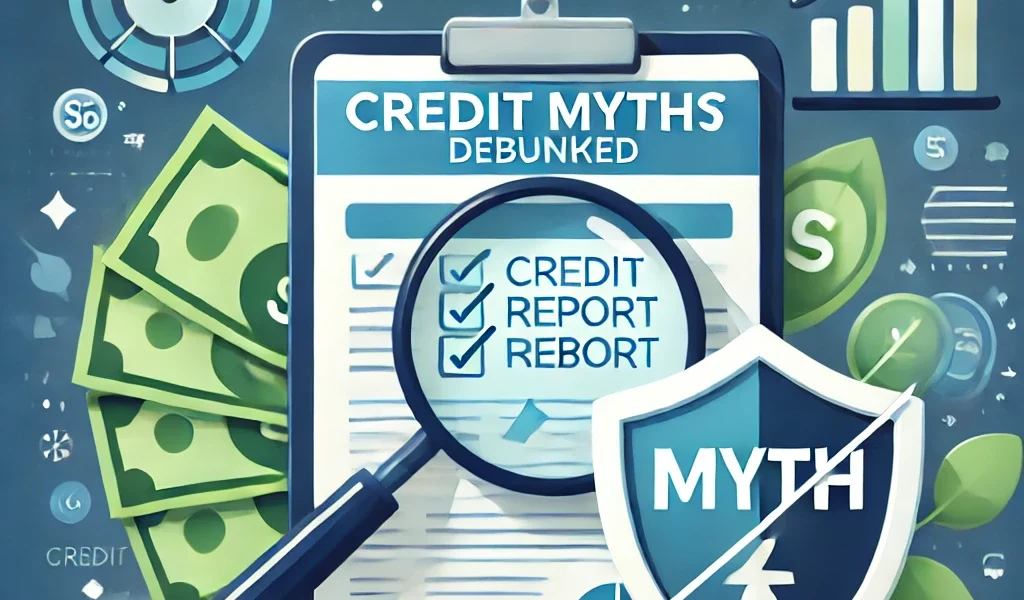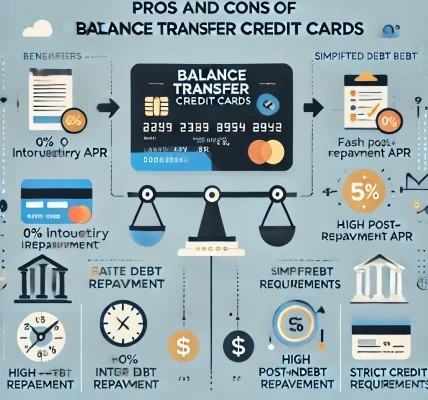Introduction
Credit scores and reports play a vital role in personal finance, influencing everything from loan approvals to interest rates. Unfortunately, many misconceptions surround credit, leading people to make financial decisions based on myths rather than facts.
This guide will debunk common credit myths, clarify how credit scores and reports work, and provide practical tips to maintain a strong financial standing.
Myth #1: Checking Your Credit Score Hurts Your Score
Truth: Checking your own credit score (a “soft inquiry”) does NOT affect your credit score. Only “hard inquiries,” which occur when a lender pulls your credit report for a loan or credit application, can temporarily lower your score.
How to Monitor Your Credit Safely
- Use free credit monitoring services like Experian, Equifax, or TransUnion.
- Check your credit report at least once a year through AnnualCreditReport.com.
- Avoid excessive hard inquiries within a short period.
Myth #2: Closing Old Credit Accounts Improves Your Credit Score
Truth: Closing old credit accounts can actually hurt your credit score by reducing your credit history length and available credit, which can increase your credit utilization ratio.
What You Should Do Instead
- Keep older credit accounts open, even if you don’t use them frequently.
- Use your old credit cards occasionally for small purchases to keep them active.
- Pay off balances in full each month to avoid interest.
Myth #3: Carrying a Credit Card Balance Boosts Your Credit Score
Truth: Carrying a balance does not help your credit score and only results in paying unnecessary interest. Your credit utilization (how much credit you’re using compared to your total limit) should ideally stay below 30% for a good score.
Best Practices
- Pay off your credit card balances in full each month.
- If you must carry a balance, keep it low to minimize interest charges.
- Consider making multiple payments each month to reduce utilization.
Myth #4: All Debt is Bad for Your Credit
Truth: Not all debt is harmful. Some forms of debt, like mortgages, student loans, and responsible credit card use, can actually help build credit if managed well.
Types of Debt:
✅ Good Debt – Mortgages, student loans, and business loans (when used wisely) can contribute positively to your financial future. ❌ Bad Debt – High-interest credit card debt, payday loans, and excessive personal loans can lead to financial stress and poor credit.
Myth #5: Your Income Affects Your Credit Score
Truth: Your credit score is based on credit history, utilization, payment history, and length of credit history, NOT on your income level.
Factors That Affect Your Credit Score
- Payment History (35%) – On-time payments matter most.
- Credit Utilization (30%) – Keeping balances low helps.
- Length of Credit History (15%) – Older accounts contribute positively.
- New Credit (10%) – Too many inquiries can lower your score.
- Credit Mix (10%) – A variety of credit accounts can help.
Myth #6: You Need a High Credit Score to Get Approved for Loans
Truth: While a high credit score helps you get the best interest rates, lenders also consider other factors such as income, employment history, and debt-to-income ratio.
Tips for Loan Approval
- Maintain a credit score above 670 for better rates.
- Show steady income and employment history.
- Keep your debt-to-income ratio low.
Myth #7: You Can’t Get a Loan or Credit Card with a Low Credit Score
Truth: While having a low credit score makes approval harder, options like secured credit cards, credit-builder loans, and co-signed loans can help you get approved and rebuild credit.
Steps to Rebuild Credit
- Get a secured credit card and make small purchases.
- Apply for a credit-builder loan to show positive payment history.
- Make on-time payments consistently.
- Avoid applying for multiple new credit accounts at once.
Myth #8: Bankruptcy Permanently Destroys Your Credit
Truth: Bankruptcy damages your credit but does NOT ruin it forever. It remains on your credit report for 7 to 10 years, but you can rebuild your score over time by using credit responsibly.
How to Rebuild Credit After Bankruptcy
- Apply for a secured credit card.
- Keep balances low and make all payments on time.
- Monitor your credit report for errors and dispute them.
Myth #9: Credit Reports Are Always Accurate
Truth: Errors in credit reports are common and can negatively impact your score. It’s important to check your credit report regularly and dispute any inaccuracies.
How to Fix Credit Report Errors
- Obtain your credit report from AnnualCreditReport.com.
- Look for incorrect accounts, duplicate debts, or fraudulent activity.
- Dispute errors directly with the credit bureaus (Experian, Equifax, TransUnion).
Myth #10: Married Couples Share a Credit Score
Truth: Each person has an individual credit score. However, joint accounts and co-signed loans affect both partners’ credit.
How Marriage Affects Credit
- Applying for joint credit affects both partners’ scores.
- One spouse’s bad credit doesn’t impact the other unless accounts are shared.
- Responsible joint credit use can help improve both scores.
Conclusion: Knowing the Truth About Credit
Believing in credit myths can lead to financial mistakes. Understanding how credit scores and reports work will help you make smarter financial decisions.
Key Takeaways
✔ Check your credit score regularly – It won’t hurt your credit. ✔ Keep old accounts open – They help build a strong credit history. ✔ Pay off balances in full – Carrying debt doesn’t improve your score. ✔ Dispute credit report errors – Mistakes can lower your score unfairly. ✔ Rebuild credit responsibly – Even after bankruptcy or bad credit history.




